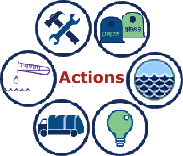|
Managers
Advanced

|
|
Environmental Awareness Information
Environment
| 'Sustainability' refers to the absolute carrying capacity of this earth to maintain a population in a decent sate of wellbeing. Quite what the "carrying capacity" is, we dont know. But we know there are absolute limits - to the amount of fossil fuels and other valuable minerals (Links - came across one other day..Where???), to the amount of food and water available. There are also limits to how much carbon dioxide we can make without the world warming up beyond control. |
 |
Sustainable Development refers to the process of how we are going to achieve sustainability. Clearly there are many ways, but the crucial componenet is "development" - there must be development to achieve well being for many more, but quite how we do that is subject of much debate. |
| Click to read other peoples Definitions of Sustainable Development. |
Maureen says: "It is taking care of the future" |

|
Everyones idea of what Sustainable Development means differs,
have a go at deciding what it means to you
|
|
Law
Understand the legislation relating to environmental issues e.g. Environmental Protection Act 1990, Landfill Directive 1999, Landfill Tax Regulations 1996, Climate Change Levy (which came into force from April 2001) Clean Air Act 1993, Transport pollution legislation, Water Resources Act 1991, Water Industries Act 1991, Directives on waste electrical and electronic equipment, e.g. Producer Responsibility Obligations (Packaging Waste) Regulations 1997.
Explanation of UK Environmental law
6 Assess the impact and practical implications of the legislation
Environmental Management
Two thirds of companies, asked in a recent survey (details?) siad that they "went beyond the law" where environmental matters are concerned.
Environmental management offers a coherent and consistent way for organisations to deal witih environmental issues. By using a management system, especially one to international standards, organisations can handle a range of complex but interwined issues in the same way. Whether it is noise, chemcial, energy, waste or whatever, your organisation can deal with the issues in a cosnsistant manner. This is based on classic quality systems byt first reviewing existing state of affairs, posting a policy, setting targets and then monitoring and auditing results.
By using an international standard, other organisations can appreciate what your organisation does. Some purchasers now make such a system a compulsorty requirement for supply.
|
 DEVELOPING ENVIRONMENTAL AWARENESS
DEVELOPING ENVIRONMENTAL AWARENESS  DEVELOPING ENVIRONMENTAL AWARENESS
DEVELOPING ENVIRONMENTAL AWARENESS